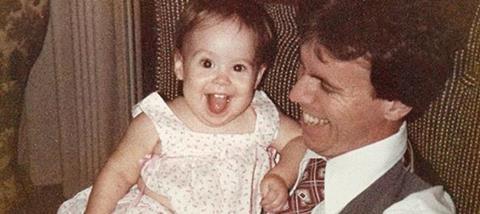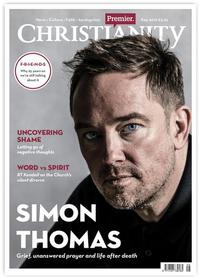
When I was 13 years old, my dad died from AIDS as a result of a same-sex relationship outside of his marriage. So when as a follower of Jesus, I get called a bigot, it hurts me deeply. I loved my dad; most of my happiest childhood memories were shared with him. We danced to Carly Simon. We baked Black Forest Cherry Cake. We sat together in our rocking chairs on warm North Carolina nights, marvelling at God’s universe.
But most of all I loved him because, more than any other person in my life, he pointed me to Jesus. When I was nine, he gave me the Bible I still use today. He wanted me to know how important it was to follow Jesus, come what may. He suffered intensely from AIDS, but he told me that he suffered more from his betrayal of Christ. He knew he had sinned, and was deeply sorry. I witnessed his repentance and his childlike joy when he knew he was forgiven. It remains the single most important example for my own life.
When I found out about my dad’s same-sex attraction, I was shocked, not because of any scrupulous moral principles I had, but because of how he had struggled alone for so many years. He came from a Southern Baptist military family, and he’d had a difficult relationship with his own father, who had been a Green Beret. He wasn’t macho or on the football team like his older brother; he was just different.
In those years, same-sex attraction was taboo, and my dad could not share his feelings at home or at church. At the same time, he felt called by Jesus and wanted to dedicate his life to Jesus as a pastor. But what pastor was allowed to be same-sex attracted in the 1970s? So he did the “right thing,” got married, had two children, and became a pastor of a Quaker church.
But he couldn't shake his same-sex attraction. He knew God’s commands; he knew there would be no blessing on a parallel gay lifestyle, but he was unable to share his burden or ask for help. Eventually, all alone, he gave in to temptation.
The churches failed my dad then, and they are failing people like him now, but it doesn’t have to be that way. I’ve found Ed Shaw’s book The Plausibility Problem a great help in this regard. Shaw, a celibate, same-sex attracted pastor, challenges churches on their lack of support for same-sex attracted Christians. All of us, he says, are subject to temptations, and all of us need help to overcome them. All Christians need the support of a church family to follow Jesus, but because many churches either refuse to discuss same-sex attraction for fear of being labelled homophobic, or encourage same-sex attracted people to live a gay lifestyle in the same spirit of compromise, most same-sex attracted Christians don’t get the support they need.
Rather than helping him, Shaw says, churches make his life difficult by being unclear, even hypocritical, about a sin like divorce and remarriage, and by not clarifying the sacrifices required for true discipleship. He writes of what he calls “kitchen floor moments,” when he feels acutely the sacrifices of the stand he is taking.
“What will help me get up off the kitchen floor is seeing other Christians sacrifice short-term happiness out of obedience to God’s Word. I’m most encouraged to obey what God says about sex by the costly obedience I see other Christians make. A good friend has been willing to sacrifice his professional reputation to take a stand for truth. Another friend persevered in a marriage nearly everyone else would have walked away from – because he knows God hates divorce. All of them are the sort of people who have most made me feel the possibility of the life that I’m living, and I praise God for them.” Such shared sacrifices are crucial to reinforcing the idea that the church is a place of welcome to same-sex attracted disciples.
The church loses its voice and authority when it holds same-sex attracted people to a higher standard than others; fidelity to the gospel includes us all. We cannot ignore adultery or limply justify divorce and remarriage and cohabitation while condemning homosexuality; the Bible contains strong moral judgments on all of them. No one of us chooses our demons; they choose us, and in that sense, the church has to accept those individuals who seem to have fixed, unremitting same-sex attraction, and help them with hope and truth.
My dad died still looking for a supportive church family – a church that did not condemn, a church focused on trying to live out the Sermon on the Mount with love and care for all seven days a week. Thankfully, Shaw found a church family to fill the lonely hours when he, like other singles, found himself missing a spouse and children of his own to come home to. And I found a church family, too, when I joined the Bruderhof. Here, with my husband, Dan, and our three children, we can help each other put God’s will before our own will; our faithfulness to Jesus before our pursuit of happiness. Within my own church community, I’ve seen gay congregants find peace and answers in either singleness or God-ordained marriage within the fellowship. If my dad had found such support, things could have turned out very differently.
It’s not just Ed Shaw and my dad; there are others who’ve made this sacrifice, too. Sam Allberry (Is God Anti-Gay?) and Wesley Hill (Washed and Waiting) are exclusively same-sex attracted Christians for whom celibacy is the only option to stay faithful to God’s commands. Rosaria Butterfield (The Secret Thoughts of An Unlikely Convert), on the other hand, was able to renounce her lesbian lifestyle to marry and adopt children in the church. All of them, out of love to Jesus, put God first and had the courage to publish their stories.
People with same-sex attraction who want to follow Jesus may be among the most important witnesses of our time. They are taking a brave, uncompromising stand for the gospel that requires great personal sacrifice. They are asking the church to stand together with them. The church needs to be there for people like my dad, and for each one of us. We are all sinners, whether we are heterosexual or same-sex attracted. We cannot single out specific sins or certain individuals for condemnation, because the truth for everyone is that when we put Jesus before our self-interests, all can be redeemed.
The apostle Paul speaks of this crucial unity, praying for the day when “we may no longer be children, tossed to and fro by the waves and carried about by every wind of doctrine, by human cunning, by craftiness in deceitful schemes. Rather, speaking the truth in love, we are to grow up in every way into him who is the head, into Christ, from whom the whole body, joined and held together by every joint with which it is equipped, when each part is working properly, makes the body grow so that it builds itself up in love” (Ephesians 4:14–16). If one group of believers turns judgmentally on another group, the ship of the church will founder in the storm. But when sinners – no matter what their sin – unite in their need of grace and repentance, the church will only be strengthened.
Emily Hallock is a blogger and mother of three who lives at Beech Grove, a Bruderhof in Kent, England. This blog first appeared on Bruderhof and in the Autumn issue of Plough Quarterly.
Enjoyed that? Get more articles covering news, culture, faith and apologetics in every print issue of Premier Christianity magazine. Subscribe now for HALF PRICE (limited offer)





























